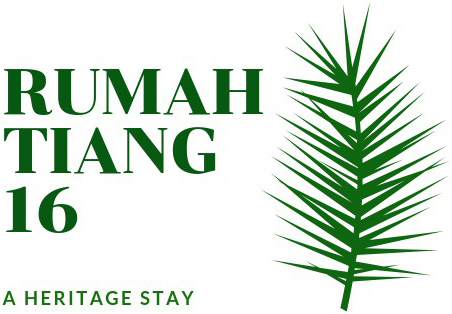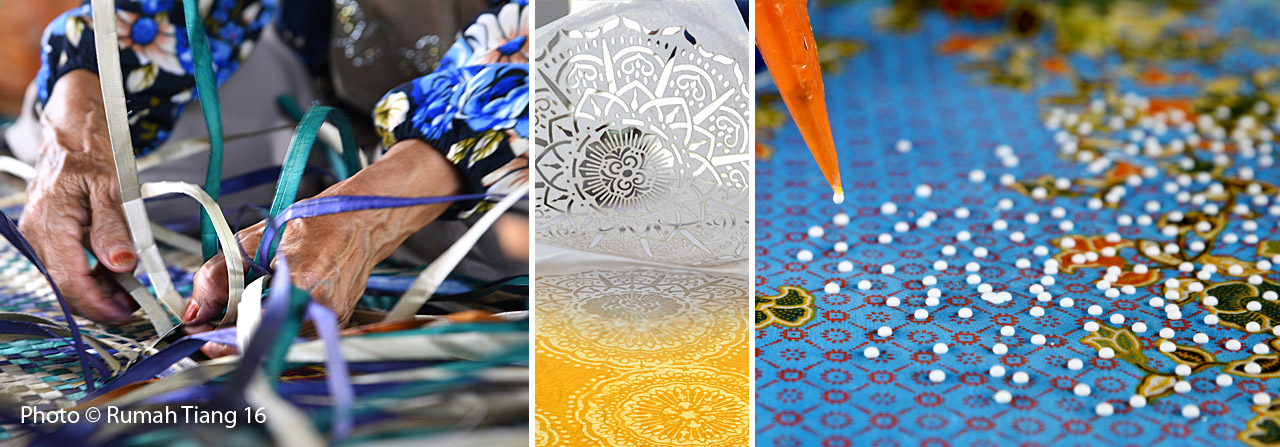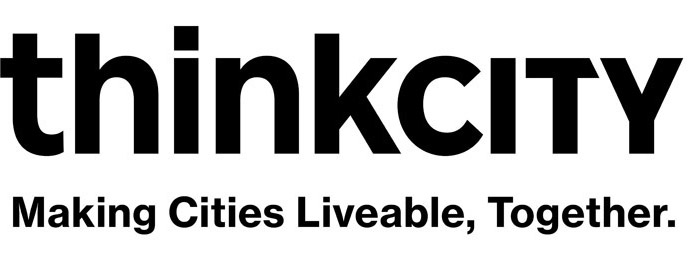A Look at Some Specials at Lenggong Valley
Ikan pekasam, a local delight to whet the appetite
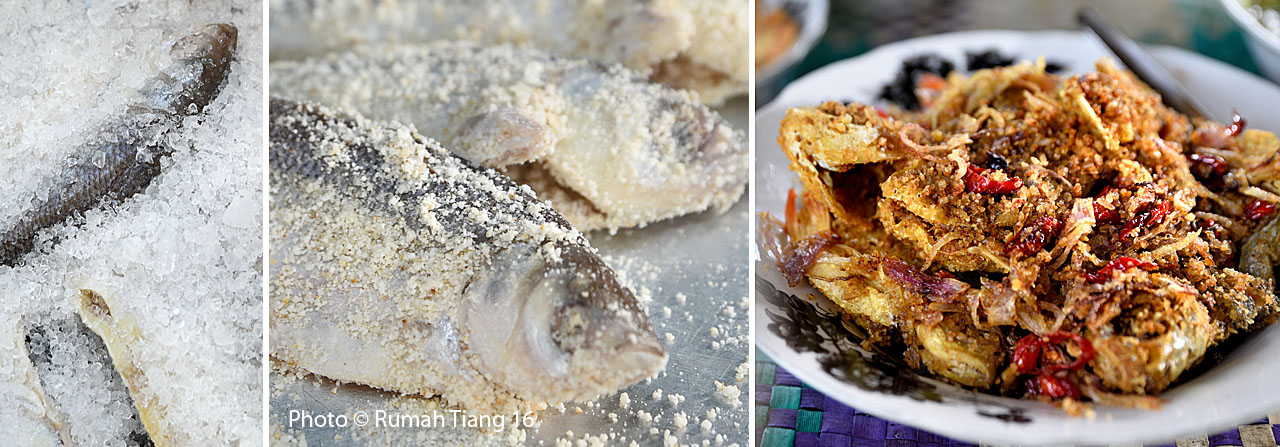
Pekasam is one of the methods used by the Malays to preserve fish. In earlier days, villagers depended on rivers and ponds for their source of fish supplies. During certain seasons, the amount of fish caught could be more than what the family could eat. Since electricity and refrigerators were not available to keep the fish fresh, they would preserve the fish with salt and asam gelugor (garcinia atroviridis) to make it last longer. Pekasam fish (traditional preserved fish) is a Northern Malaysian specialty, often using freshwater fish.
Fish that is preserved, the pekasam gives the oomph to many a meal. After being thoroughly cleaned, the fish is salted for two weeks, washed, then allowed to ferment for a further three weeks. The ingredients deployed for the fermentation are unique to pekasam making – toasted rice, tamarind paste and brown sugar. The fermented fish is washed then packaged for sale with some toasted rice.
Lenggong is famous for its ikan pekasam. Mak Su Minah has been making pekasam fish for over 20 years. You can reach Mak Su Minah at +6013 479 7851.
Alternatively, you can also contact Bohoiiri Mohd Nizar (Buii) at +6013-478 6655.
Kuih bahulu – delicious fluffy sponge cakes
These cakes are a Hari Raya special, mini light and fluffy sponge cakes made from a mixture of eggs, sugar and flour. Beaten until fluffy and filled with micro air bubbles, the batter is baked in a metal mould over hot coals with a lid laden with burning coconut husks. The dainty fluffy cakes have a slightly crusty outer layer with a soft and fluffy inside. These eggy sponge cakes are ideal for tea time and best enjoyed with local black coffee. They comes in various shapes and sizes but the popular ones include those with the goldfish and the button flower designs.
To purchase some homemade kuih bahulu in Lenggong, contact Makcik Yah at +6011-2431 0156.
Of sago palm making and mengkuang weaving
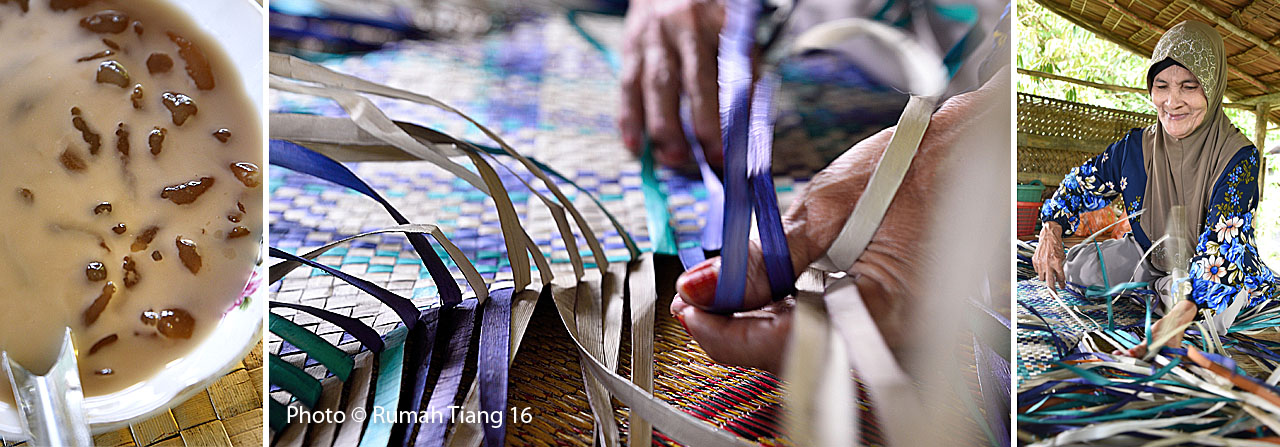
The sago palm is a common sight in Lenggong Valley. However, the process of transforming the starch from the tree into flour is laborious and time-consuming. When pried open, the bark of a mature tree reveals a white centre; this is grated, sieved and water added. Sap is then squeezed from the starch and the cleaned mass is dried under the sun in a metal tray. This starch is stirred constantly to ensure that there are no lumps and that it dries evenly.
From the sago starch, Mak Lang (Salmiah Bakri) makes delicacies such as cendol sago rumbia and kuih bakar rumbia. At the traditional kampung-style lunch at Mak Ani’s dangau, chilled cendol sago rumbia in santan (coconut milk), sweetened with gula melaka (palm sugar), is served to conclude the meal.
Mak Lang artistically produces attap, mats and other beautiful crafts from the palm leaves. After luncheon, Mak Lang is at hand to share the art of weaving a mengkuang mat to those interested. Her fingers are continuously moving as they gracefully weave strips and strips of coloured mengkuang leaves. She believes that the more people know about a craft heritage such as this, the more they will appreciate and support endeavours to preserved the art form for generations to come.
Weaving used to be a leisurely pastime of coastal village womenfolk. The tedious process requires patience, skill and dedication. To begin with, the mengkuang (pandanus odoratissimus) leaves are first stripped of their thorns, split into long strands, soaked and dried in the sun. Once thoroughly dried, they are boiled and dyed. While some are left in their natural beige colour, many are dyed with a rainbow array of vibrant hues that are both eye-catching and attractive. Using a combination, coloured strips are woven according to the required designs into countless objects – bags, baskets, mats, etc. The design of motifs or kelarai is often inspired by the beautiful flora and fauna of mother nature.
Mak Lang learnt the art of weaving from her mother and is happy to keep the tradition alive. Mak Lang’s mats are among her popular items for sale. These products make excellent souvenirs and gifts to celebrate an unforgettable holiday.
Contact Pak Lang at +6013-520 9578 to order a mat or two.
Crispy homemade banana chips
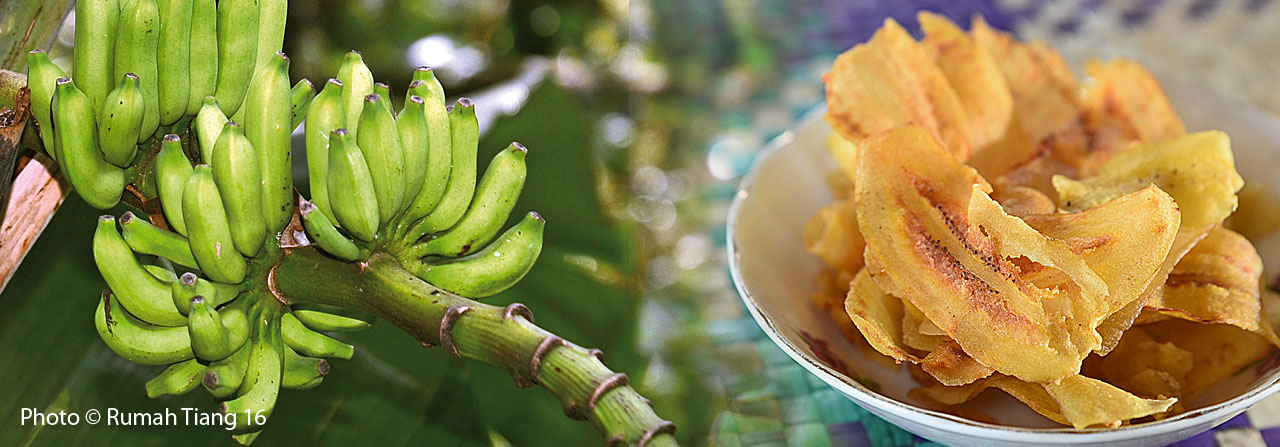
The banana is a native plant of Southeast Asia and the people of the archipelago have developed many uses for it for ages, including as a snack. Banana chips are best made from firmer, starchier banana varieties, often under-ripe ones.
Mak Lang (Salmiah Bakri) makes paper thin, crispy golden banana chips that are simply addictive. Once you start, it is difficult to stop. Three types of bananas – pisang abu, pisang nangka and pisang tanduk – are thinly sliced then deep-fried to crispy perfection. The bananas are all harvested from her very own garden.
To order, contact Pak Lang at +6013-520 9578.
